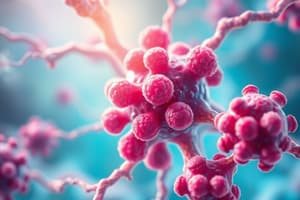Podcast
Questions and Answers
What does chromatin biology and gene regulation focus on?
What does chromatin biology and gene regulation focus on?
- The conversion of genetic information into functional RNA molecules
- The structure and function of chromatin (correct)
- The study of cellular components and their interactions
- The synthesis of proteins and the regulation of gene expression
What do RNA processing and gene expression involve?
What do RNA processing and gene expression involve?
- The repair of damaged DNA
- The regulation of cell division and the progression through the cell cycle
- The study of cellular components and their interactions
- The conversion of genetic information encoded in DNA into functional RNA molecules (correct)
What does cell structure and function encompass?
What does cell structure and function encompass?
- The synthesis of proteins and the regulation of gene expression
- The regulation of cell division and the progression through the cell cycle
- The copying of DNA molecules
- The study of cellular components, such as the cytoskeleton, cell membrane, and various organelles (correct)
Why are cell division and cell cycle control essential aspects of cell biology?
Why are cell division and cell cycle control essential aspects of cell biology?
What is molecular biology a subfield of?
What is molecular biology a subfield of?
Study Notes
Introduction to Cell Biology
Cell biology is an academic discipline that studies cells, focusing on their physiological properties, structure, organelles, interactions with their environment, life cycle, division, and death. This field investigates cells on both microscopic and molecular levels, extending to the diversity of single-celled organisms like bacteria and the cells that make up multi-cellular organisms. Cell biology is essential for understanding tissues, organs, and the living organisms that cells form.
Subtopics in Cell Biology
Cellular Metabolism
Cellular metabolism refers to the chemical processes that occur within cells to convert nutrients into energy and build and repair cellular components. These processes include cell respiration, photosynthesis, and various biochemical reactions.
Signal Transduction
Signal transduction is the process by which cells receive and transmit signals from their environment or from other cells, allowing them to respond to changes in their surroundings. This process involves various molecular pathways and signaling molecules that help cells adapt to their environment and maintain homeostasis.
DNA Replication & Repair
DNA replication and repair are essential processes that enable cells to reproduce and pass on their genetic information to their daughter cells. These processes involve the copying of DNA molecules and the repair of damaged DNA, ensuring the accurate transmission of genetic information.
Chromatin Biology/Gene Regulation
Chromatin biology and gene regulation focus on the structure and function of chromatin, which is a complex of DNA and histone proteins. These processes enable cells to control the expression of specific genes and respond to various environmental cues.
RNA Processing/Gene Expression
RNA processing and gene expression involve the conversion of genetic information encoded in DNA into functional RNA molecules, such as mRNA, tRNA, and rRNA. These processes are crucial for the synthesis of proteins and the regulation of gene expression.
Cell Structure and Function
Cell structure and function encompass the study of cellular components, such as the cytoskeleton, cell membrane, and various organelles. Understanding the structure of cells is essential for understanding their function and the interactions between different cellular components.
Cell Division and Cell Cycle Control
Cell division and cell cycle control are essential aspects of cell biology, as they allow cells to reproduce and maintain the balance between cell numbers and the environment. These processes involve the regulation of cell division and the progression through the cell cycle, ensuring the orderly growth and reproduction of cells.
Molecular Biology
Molecular biology is a subfield of cell biology that focuses on the study of molecular structures, such as proteins, nucleic acids, and lipids. Molecular biology techniques, such as gene cloning, recombinant DNA technology, and protein purification, enable researchers to manipulate and analyze these molecules to better understand cellular processes.
Interdisciplinary Approaches in Cell Biology
Cell biology is an interdisciplinary field that often overlaps with other biological disciplines, such as genetics, biochemistry, and microbiology. The emergence of systems biology has further encouraged the analysis of living systems within the context of other biological disciplines, promoting a more comprehensive understanding of cellular processes.
In conclusion, cell biology is a vast and interdisciplinary field that encompasses various subtopics, from cellular metabolism to cell division and gene expression. By studying cells on both microscopic and molecular levels, researchers can gain a deeper understanding of the living organisms they form and develop new technologies to improve human health and well-being.
Studying That Suits You
Use AI to generate personalized quizzes and flashcards to suit your learning preferences.
Description
Explore the diverse subtopics and interdisciplinary approaches in cell biology, from cellular metabolism to molecular biology and interdisciplinary overlaps with genetics, biochemistry, and microbiology. Gain insight into the physiological properties, structure, organelles, interactions, and life cycle of cells.




